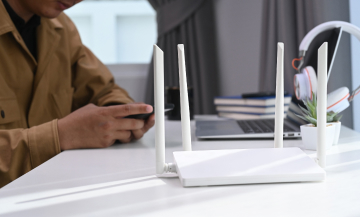
Setting up your broadband router should not be a stressful process. The world has become a global village and as a result, a reliable and fast internet connection is essential for both work and leisure. Setting up your broadband router at home or in the office should be the least of your worries, and that is exactly the purpose of this article, to guide you and streamline the process to get your internet connection up and running in five minutes.
The internet has become such a huge part of our everyday lives, from seemingly common tasks such as sending and receiving emails, shopping online, and making calls to complex tasks like transmitting and processing data, online gaming, video conferencing, artificial intelligence, and augmented reality. A reliable and fast internet connection is crucial for almost everything we do.
Understanding your Broadband Router
Before we delve into the detailed step-by step guide, it is important to comprehend the fundamental operations of a broadband router. The router acts as the focal point, enabling communication between your devices, including laptops, smart phones, and smart TVs, and connecting them to the internet. It receives data from your Internet Service Provider (ISP) and distributes it to the devices in your home or office. The router can be wireless-connecting to the modem directly via cable; this will enable you to receive information from and transmit information to the internet using in-built antennas. All the devices in your home and office can connect simultaneously. The router can also be wired-connecting directly to a computer through a port that transmits data from the modem to the internet.
By choosing the correct router, you can take advantage of faster internet speeds and shield your family and business from hackers and other cyber threats. It is not necessary to be a tech expert to determine the kind of router you require. Having this basic understanding of router definitions and functions will help you select the appropriate hardware for your home or office connection.
Now let’s dive into the step-by-step guide to setting up your broadband router
Step 1: Get Your Equipment Ready
Before setting up your broadband router, make sure you have all the necessary equipment at your disposal. This includes:
- Broadband router
- Power adapter
- Ethernet cable
- Manual or pamphlet provided by your Internet Service Provider
Having everything you need ready ahead of time ensures a smooth installation process, avoiding unwanted delays.
Step 2: Choose an Ideal Location
The performance of your broadband router is greatly impacted by its location. Select a central location to optimise Wi-Fi coverage across your home or place of business. Do not put the router in an enclosed space, such as a cupboard. Keep the router away from large appliances or walls that may impede the signal. Raising the router to a desirable height, such as a shelf, can make it more receptive to signals, thereby improving its efficacy and range.
Step 3: Connect the Hardware
Begin by taking out your broadband router from its package. The next thing to do is to attach the power cable to your router and insert it into an electrical power outlet. Use the included Ethernet cable to connect the router to your modem after it has been turned on. Usually, your router’s internet port, also known as WAN, receives this cable. This initial connection establishes the link between your router and the internet, paving the way for the subsequent steps.
Step 4: Accessing the Router’s Interface
Now that the hardware is in place, it is time to connect to the router’s interface. Open the web browser on your computer or mobile device and type in the IP address of the router into the address bar. This information can be found in the manual that came with your router or on a label placed on the router itself. After entering the address, press Enter to gain access to the router’s interface.
Step 5: Configure Router Settings
To access the router’s interface, enter a default username and password from the router manual. You obtain access to a dashboard after you log in, where you can now configure the settings to suit you:
- First, choose a network name (SSID) that is distinct and easy to remember for your network.
- Create a strong and secure password that is difficult to guess. This is to prevent unauthorised access to your Wi-Fi network.
- Choose the appropriate security protocol (WPA2, WPA3, etc.) for your network
- Customise the channel to maximise your Wi-Fi performance based on your specific network environment
By configuring these settings, you can ensure a personalised and secure network that is tailored to your needs.
Step 6: Connect Your Devices
Now that you have set your network username and password, you can now connect your devices, such as laptops, tablets, and mobile phones. Select the appropriate network from the list of options displayed on your device, and enter the password when prompted.
Step 7: Place Your Router in Position
Your router is working perfectly; it’s time to place it in its permanent location, free from any obstructions. Make any final adjustments if needed, but be ready to readjust as your wireless needs change.
Step 8: Update your Hardware
Router manufacturers periodically release software updates to improve performance, fix bugs, and improve the security of your broadband router. Check the manufacturer’s website regularly for updates, and follow the instructions to download and install the most recent version. Updating the software on your router is critical for maintaining security and an efficient network.
There you have it!!
Setting up your broadband router in five minutes is an achievable goal with the right approach. Users of all technical levels can quickly set up a reliable and secure internet connection by following these easy step-by-step guide. Keep your login details confidential, update your router regularly, and enjoy the benefits of a fast and seamless internet experience. A well-configured router is the key to staying connected and enjoying the digital lifestyle, whether in the home or office.
